Big Banks Hiding Real Debt and Risk Levels from Investors in Corporate Earnings Reports
Stock-Markets / Financial Markets 2010 Apr 11, 2010 - 06:19 AM GMT Major banks have masked their risk levels in the past five quarters by temporarily lowering their debt just before reporting it to the public, according to data from the Federal Reserve Bank of New York. A group of 18 banks—which includes Goldman Sachs Group Inc., Morgan Stanley, J.P. Morgan Chase & Co., Bank of America Corp. and Citigroup Inc.—understated the debt levels used to fund securities trades by lowering them an average of 42% at the end of each of the past five quarterly periods, the data show. The banks, which publicly release debt data each quarter, then boosted the debt levels in the middle of successive quarters.
Major banks have masked their risk levels in the past five quarters by temporarily lowering their debt just before reporting it to the public, according to data from the Federal Reserve Bank of New York. A group of 18 banks—which includes Goldman Sachs Group Inc., Morgan Stanley, J.P. Morgan Chase & Co., Bank of America Corp. and Citigroup Inc.—understated the debt levels used to fund securities trades by lowering them an average of 42% at the end of each of the past five quarterly periods, the data show. The banks, which publicly release debt data each quarter, then boosted the debt levels in the middle of successive quarters.
Excessive borrowing by banks was one of the major causes of the financial crisis, leading to catastrophic bank runs in 2008 at firms including Bear Stearns Cos. and Lehman Brothers. Since then, banks have become more sensitive about showing high levels of debt and risk, worried that their stocks and credit ratings could be punished.
Fannie and Freddie Executives, “We didn’t see it coming.”
Facing a barrage of questions about problems with Fannie Mae and Freddie Mac's capital, leverage and risk-management during the build up to the financial crisis, two key housing officials defended their tenure and argued that the two mortgage industry giants were engulfed by an unprecedented decline in home prices that was catastrophic and unforeseeable.
"Few if any predicted the unusual and rapid destruction of real estate values that occurred," Robert Levin, former Executive Vice President and Chief Business Officer of Fannie Mae told a financial crisis inquiry panel. What do you think?
Little buying power, but no selling pressure yet.
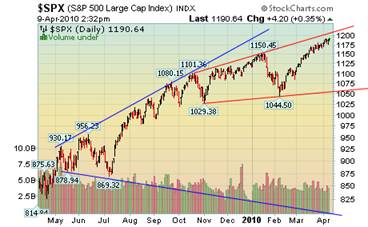 -- The S&P 500 is floating higher on very low volume. The quarter end window dressing is over and professional interest in equities is waning. While retail investors are “all in” the market, institutional investors are starting to hedge their market positions. Smart money is looking for exits.
-- The S&P 500 is floating higher on very low volume. The quarter end window dressing is over and professional interest in equities is waning. While retail investors are “all in” the market, institutional investors are starting to hedge their market positions. Smart money is looking for exits.
Who will buy Treasury bonds now?
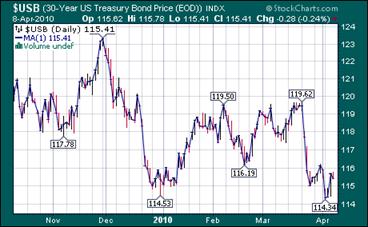 The Fed is allegedly all done buying MBS and Treasury paper. This cuts off an important source of liquidity for the Treasury, commodity, and stock markets. The enormous flood of liquidity that the Federal Reserve injected into the financial system has found its way into the Treasury market, supporting government borrowing and also lowering interest rates for the housing market. How will the Treasury market respond once the liquidity spigot is turned off?
The Fed is allegedly all done buying MBS and Treasury paper. This cuts off an important source of liquidity for the Treasury, commodity, and stock markets. The enormous flood of liquidity that the Federal Reserve injected into the financial system has found its way into the Treasury market, supporting government borrowing and also lowering interest rates for the housing market. How will the Treasury market respond once the liquidity spigot is turned off?
Break-out or fake-out in gold?
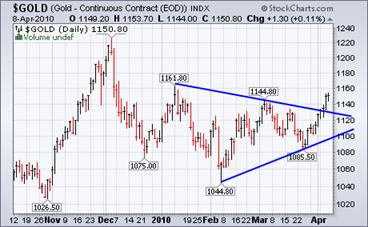 -- Gold climbed to the highest price since December as investors sought an alternative to holding currencies. “Gold is becoming the global go-to currency,” said Matt Zeman, a trader at LaSalle Futures Group in Chicago. “People have been losing faith in fiat currencies as governments around the world dig themselves into huge deficits. Hard assets are going to benefit.” What appears to be a breakout may have other interpretations for those who know technical patterns.
-- Gold climbed to the highest price since December as investors sought an alternative to holding currencies. “Gold is becoming the global go-to currency,” said Matt Zeman, a trader at LaSalle Futures Group in Chicago. “People have been losing faith in fiat currencies as governments around the world dig themselves into huge deficits. Hard assets are going to benefit.” What appears to be a breakout may have other interpretations for those who know technical patterns.
Nikkei has its first weekly decline.
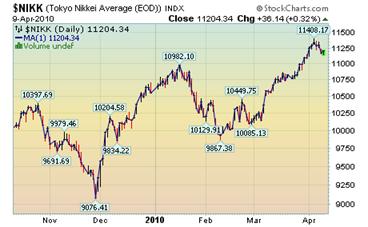 -- Japanese stocks rose, even as the Nikkei 225 Stock Average had its first weekly drop in nine periods. The Nikkei 225 Stock Average rose 0.3 percent to 11,204.34 at the 3 p.m. market close in Tokyo after falling as much as 0.2 percent. For the week the Nikkei 225 fell 0.7 percent, its first decline in nine weeks, while the Topix was unchanged.
-- Japanese stocks rose, even as the Nikkei 225 Stock Average had its first weekly drop in nine periods. The Nikkei 225 Stock Average rose 0.3 percent to 11,204.34 at the 3 p.m. market close in Tokyo after falling as much as 0.2 percent. For the week the Nikkei 225 fell 0.7 percent, its first decline in nine weeks, while the Topix was unchanged.
China no longer has a trade surplus.
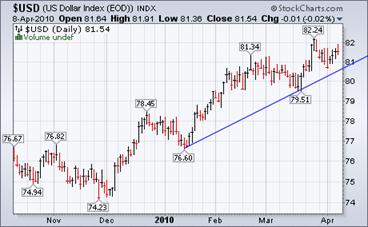 -- China’s stocks rallied the most in a week, led by phone and media companies, on an improved earnings outlook and the prospect yuan gains will attract more investment. The Shanghai Composite Index rose 26.64, or 0.9 percent, to 3,145.35 at the close. The measure dropped 0.4 percent this week on concern the government will take more measures to rein in property prices.
-- China’s stocks rallied the most in a week, led by phone and media companies, on an improved earnings outlook and the prospect yuan gains will attract more investment. The Shanghai Composite Index rose 26.64, or 0.9 percent, to 3,145.35 at the close. The measure dropped 0.4 percent this week on concern the government will take more measures to rein in property prices.
The U.S. Dollar is back on its uptrend.
 The dollar declined today versus major currencies on Friday, after reaching a 10-month higher versus the euro and other rivals, after euro-zone leaders agreed to a standby aid program for Greece in conjunction with the International Monetary Fund. Still, the dollar is headed toward a weekly gain as concerns about the euro-zone's ability to solve its problems and the impact of peripheral nations on the region's economic growth continue to make the greenback and U.S. assets more appealing to investors.
The dollar declined today versus major currencies on Friday, after reaching a 10-month higher versus the euro and other rivals, after euro-zone leaders agreed to a standby aid program for Greece in conjunction with the International Monetary Fund. Still, the dollar is headed toward a weekly gain as concerns about the euro-zone's ability to solve its problems and the impact of peripheral nations on the region's economic growth continue to make the greenback and U.S. assets more appealing to investors.
1.2 Million Households Disappear, Home Prices and Rents Fall.
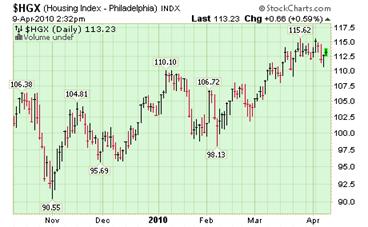 -- In really bad times, people who are evicted from their houses will not rent. Instead, they will move in with friends or family for some time.
-- In really bad times, people who are evicted from their houses will not rent. Instead, they will move in with friends or family for some time.
It thus appears that many of the people who used to own their homes, and no longer do, are doubling up with friends and family. This is probably not their first choice of living arrangements, but they are doing so because they have no other choice economically.
Gasoline prices reflect higher oil prices.
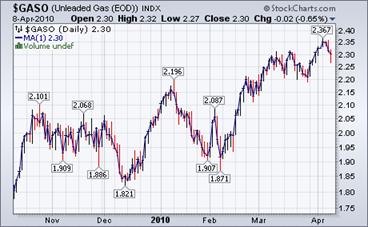 The Energy Information Agency weekly report observes, “Retail price projections reflect higher prices for the refiner acquisition cost of crude oil, expected to average about $79 per barrel ($1.88 per gallon) this summer, compared with the $62 per barrel ($1.47 per gallon) average of last summer. Wholesale gasoline margins are expected to average 43 cents per gallon this summer, up 5 cents per gallon from last summer but lower than the 5-year average of 53 cents per gallon.”
The Energy Information Agency weekly report observes, “Retail price projections reflect higher prices for the refiner acquisition cost of crude oil, expected to average about $79 per barrel ($1.88 per gallon) this summer, compared with the $62 per barrel ($1.47 per gallon) average of last summer. Wholesale gasoline margins are expected to average 43 cents per gallon this summer, up 5 cents per gallon from last summer but lower than the 5-year average of 53 cents per gallon.”
Natural Gas consumption falls.
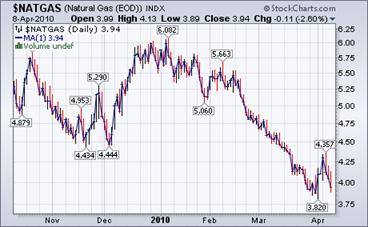 The Energy Information Agency’s Natural Gas Weekly Update reports, “Natural gas consumption in the lower 48 States fell by 14 percent since last week, with declines in all market sectors. Natural gas consumption posted declines on the week in each of the major market sectors, with decreases ranging between 1 to 30 percent, according to BENTEK Energy Services, LLC. The largest weekly declines occurred in the residential/commercial and electric power market sectors, which fell 30 percent and 3 percent, respectively.”
The Energy Information Agency’s Natural Gas Weekly Update reports, “Natural gas consumption in the lower 48 States fell by 14 percent since last week, with declines in all market sectors. Natural gas consumption posted declines on the week in each of the major market sectors, with decreases ranging between 1 to 30 percent, according to BENTEK Energy Services, LLC. The largest weekly declines occurred in the residential/commercial and electric power market sectors, which fell 30 percent and 3 percent, respectively.”
Looting Main Street.
If you want to know what life in the Third World is like, just ask Lisa Pack, an administrative assistant who works in the roads and transportation department in Jefferson County, Alabama. Pack got rudely introduced to life in post-crisis America last August, when word came down that she and 1,000 of her fellow public employees would have to take a little unpaid vacation for a while. The county, it turned out, was more than $5 billion in debt — meaning that courthouses, jails and sheriff's precincts had to be closed so that Wall Street banks could be paid.
Consumer Spending Is Up Due To Mortgage Walkaways.
In this morning's Breakfast With Dave note, David Rosenberg of Gluskin-Sheff hits on a theme we discussed the other day, about the impact of Obama's "Extend & Pretend" mortgage policy.
As originally argued by Paul Jackson at HousingWire, it's the fact that millions of families are essentially living mortgage-free which explains the seeming disconnect between sagging housing and rebounding consumer spending.
Traders alert: The Practical Investor is currently offering the daily Inner Circle Newsletter to new subscribers. Contact us at tpi@thepracticalinvestor.com for a free sample newsletter and subscription information.
Our Investment Advisor Registration is on the Web
We are in the process of updating our website at www.thepracticalinvestor.com to have more information on our services. Log on and click on Advisor Registration to get more details.
If you are a client or wish to become one, please make an appointment to discuss our investment strategies by calling Connie or Tony at (517) 699-1554, ext 10 or 11. Or e-mail us at tpi@thepracticalinvestor.com .
Anthony M. Cherniawski,
President and CIO
http://www.thepracticalinvestor.com
As a State Registered Investment Advisor, The Practical Investor (TPI) manages private client investment portfolios using a proprietary investment strategy created by Chief Investment Officer Tony Cherniawski. Throughout 2000-01, when many investors felt the pain of double digit market losses, TPI successfully navigated the choppy investment waters, creating a profit for our private investment clients. With a focus on preserving assets and capitalizing on opportunities, TPI clients benefited greatly from the TPI strategies, allowing them to stay on track with their life goals
Disclaimer: The content in this article is written for educational and informational purposes only. There is no offer or recommendation to buy or sell any security and no information contained here should be interpreted or construed as investment advice. Do you own due diligence as the information in this article is the opinion of Anthony M. Cherniawski and subject to change without notice.
Anthony M. Cherniawski Archive |
© 2005-2022 http://www.MarketOracle.co.uk - The Market Oracle is a FREE Daily Financial Markets Analysis & Forecasting online publication.



